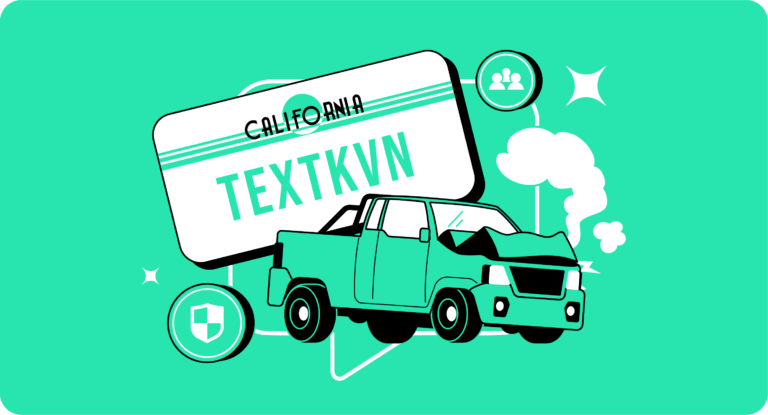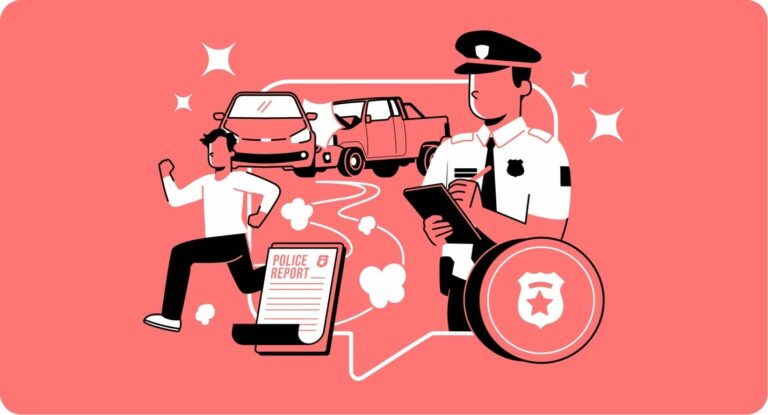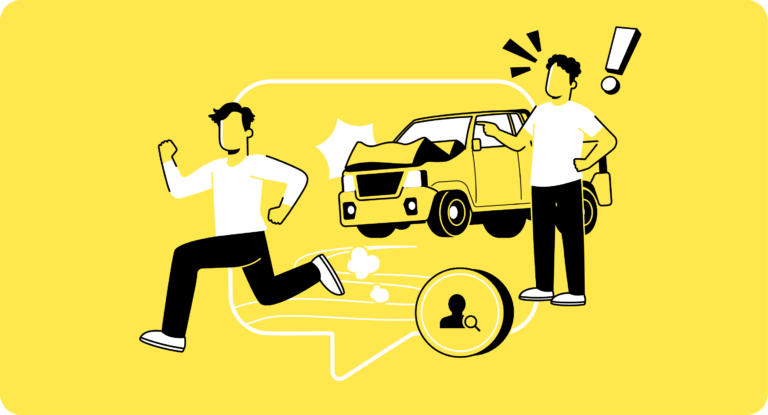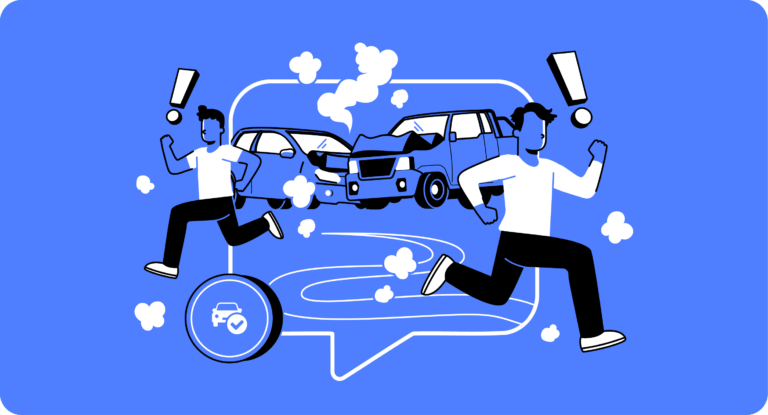Accidents are unpredictable events that can disrupt our daily lives in an instant. When involved in one, the immediate aftermath can be overwhelming, especially when you believe you’re not at fault. But what happens if you leave the scene?
Factoids About Hit-and-Run Incidents in the USA
| Factoid | Details |
|---|---|
| Hit-and-Run Increase | Fatal hit-and-runs rose by 89.4% from 2012 to 2021. |
| California’s Hit-and-Run Rate | California led with 10.1% of deadly crashes involving hit-and-runs between 2012 and 2021. |
| Nighttime Crashes | 9.5% of deadly nighttime crashes from 2012 to 2021 were hit-and-runs. |
| Pedestrian Involvement | 62.8% of deadly hit-and-runs from 2012 to 2021 involved pedestrians. |
| Insurance for Hit-and-Runs | Uninsured motorist coverage can assist hit-and-run victims, covering medical and repair costs. |
The Definition of Leaving the Scene
Being involved in an accident is a stressful event, and the moments that follow can be a blur of emotions and decisions. One of the critical choices a driver faces is whether to stay or leave the scene. But what exactly does “leaving the scene” entail, and why is it such a significant matter?
What Constitutes a “Hit and Run”
A “hit and run” isn’t just a dramatic phrase used in movies or news reports.
In the real world, it refers to a driver being involved in an accident and then choosing to leave without identifying themselves, offering aid, or reporting the incident.
It’s a serious offense, and the reasons for its severity become clear when we consider the potential harm and complications that can arise from an unreported accident.
For instance, an injured individual might not receive timely medical attention, or a damaged property might pose risks to others.
Differentiating Between Being at Fault and Not Being at Fault
It’s a common misconception that only the driver at fault in an accident has responsibilities.
In reality, every party involved in an accident has specific duties, regardless of who caused it.
Being “at fault” means your actions primarily led to the accident, perhaps due to negligence or not following traffic rules.
On the other hand, being “not at fault” means the accident was primarily caused by someone else’s actions.
However, this distinction doesn’t free you from the responsibility of staying at the scene, providing necessary details, and ensuring everyone’s safety.
Why Some Drivers Choose to Leave
The decision to leave the scene of an accident isn’t always a calculated one. Various factors can influence this choice:
- The suddenness of an accident can be disorienting, leading to rash decisions.
- Even if not at fault, some drivers fear potential legal consequences.
- The desire to avoid potential conflict with the other party involved.
Understanding these factors can shed light on the psychology behind such decisions. However, it’s crucial to remember that leaving an accident scene can lead to severe legal consequences.
Statutory Duties After an Accident
Accidents, whether minor or major, come with a set of responsibilities. These aren’t just moral obligations but are often enshrined in law.
Understanding these duties is essential for anyone who drives, as they dictate the proper course of action after an accident and can significantly impact any subsequent legal proceedings.
Immediate Responsibilities
The moments immediately following an accident are crucial. Safety is paramount.
If possible and safe to do so, drivers should move their vehicles out of active traffic lanes to prevent further accidents.
Turning on hazard lights and setting up warning triangles or flares can also alert other drivers to the situation.
But what’s equally important is checking on the well-being of all parties involved. If someone is injured, calling 911 is not just a good deed—it’s often a legal requirement.
Information Exchange Requirements
After ensuring everyone’s safety, the next step is the exchange of information.
This doesn’t mean a casual chat about how the accident happened. It’s about sharing essential details like names, addresses, driver’s license numbers, license plate numbers, and insurance information.
This exchange is vital for any future insurance claims or legal actions.
And remember, even if the other party is unresponsive or aggressive, you still have a duty to provide your information.
Special Considerations
There are instances where the standard procedures might not apply.
For example, if you hit an unattended vehicle or property, it’s your duty to make a reasonable effort to find the owner.
If unsuccessful, leaving a note with your contact and insurance information, along with a brief description of the accident, is the right course of action.
Additionally, in accidents involving injuries or fatalities, the responsibilities extend beyond just an information exchange. You might be required to remain at the scene until law enforcement arrives.
Legal Consequences of Leaving the Scene
While the immediate aftermath of an accident can be chaotic, the long-term implications of one’s actions during this period can be profound. Leaving the scene of an accident, even if you believe you’re not at fault, can lead to a myriad of legal consequences.
Understanding Penalties
The penalties for leaving the scene of an accident vary based on the severity of the incident and the harm caused.
For accidents that result in property damage, the consequences might include fines—sometimes amounting to several hundred dollars—and potential jail time.
However, if the accident led to bodily injury or, worse, a fatality, the stakes are much higher. In such cases, individuals could face felony charges, which come with heftier fines and longer jail sentences.
For instance, in some jurisdictions, causing an accident that results in serious injury and then leaving the scene can lead to up to five years in prison.
Driving-Related Consequences
Beyond the immediate legal penalties, there are driving-related consequences to consider.
Leaving the scene of an accident can lead to the suspension or even revocation of one’s driver’s license. This loss of driving privileges can last for months or even years, depending on the severity of the accident and the jurisdiction.
Additionally, once the license is reinstated, the individual might face higher insurance premiums, making the act of driving more expensive in the long run.
Restitution and Compensation
Financial implications don’t end with fines and increased insurance rates.
Individuals found guilty of leaving the scene might be ordered to pay restitution to the victims. This compensation can cover property damages, medical bills, and other accident-related expenses.
Furthermore, if the victim decides to pursue a civil lawsuit, the individual could face additional financial liabilities.
Defending Against Charges of Leaving the Scene
Facing charges for leaving the scene of an accident can be a daunting experience. The legal system can be intricate, and understanding your rights and potential defenses is paramount.
Common Defenses
While every case is unique, there are several defenses commonly employed in cases related to leaving the scene of an accident:
- Lack of Knowledge
- Misidentification
- Emergency Situations
Legal Representation
When facing charges, having competent legal representation can make a significant difference.
A knowledgeable attorney can evaluate the evidence, advise on the best course of action, and represent your interests in court.
They can also negotiate with prosecutors, potentially leading to reduced charges or even case dismissal.
Preventative Measures and Best Practices
Understanding the aftermath of leaving an accident scene is crucial, but it’s equally vital to focus on preventative measures and best practices. By being proactive, drivers can mitigate risks and handle any incidents more effectively.
Safe Driving Habits
Safe driving extends beyond just obeying traffic rules. It’s about being consistently aware of your surroundings, anticipating potential hazards, and avoiding distractions. Additionally, regular vehicle maintenance ensures your car remains in optimal condition, reducing the chances of unexpected breakdowns or malfunctions.
Preparedness for Potential Accidents
Even with the utmost caution, accidents can happen. Being prepared makes all the difference.
Keeping an emergency kit in your car, having essential documents like your driver’s license and insurance information at hand, and gathering witness contact details if an accident occurs can be invaluable.
Post-Accident Calmness and Clarity
Emotions can run high after an accident.
However, maintaining a level head, assessing the situation rationally, and taking appropriate steps ensures you’re on the right path.
Your immediate actions can significantly influence long-term outcomes.
Need Assistance After an Accident? Reach Out Today.
If you’ve been involved in an accident and are seeking guidance on the next steps, Crockett Law Group is here to help.
With a dedicated team of traffic accident attorneys, they’re committed to protecting your rights and ensuring you receive the support you need.
Don’t hesitate—call (800) 900-9393 and get the assistance you deserve.










